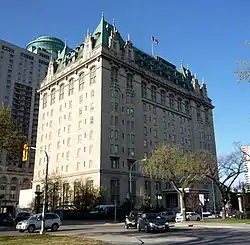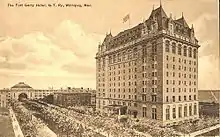Fort Garry Hotel
The Fort Garry Hotel—officially the Fort Garry Hotel, Spa and Conference Centre[1]—is an early-20th-century hotel in downtown Winnipeg, Manitoba, that opened for the first time on December 11, 1913.[2] Built by the Grand Trunk Pacific Railway, it is one of Canada's grand railway hotels and the only surviving remnant from that era in Winnipeg.[3][4]
| Fort Garry Hotel | |
|---|---|
 Fort Garry Hotel in 2009 | |
| General information | |
| Architectural style | Châteauesque |
| Location | 222 Broadway Winnipeg, Manitoba, Canada |
| Coordinates | 49°53′16″N 97°08′12″W |
| Opening | December 11, 1913 |
| Owner | Rick Bel and Ida Albo |
| Technical details | |
| Floor count | 10 |
| Design and construction | |
| Architect(s) | Ross and Macdonald |
| Developer | Fuller Company |
| Designations | |
| Official name | Fort Garry Hotel National Historic Site of Canada |
| Designated | 1981 |
| Municipally Designated Site | |
| Designation | Winnipeg Landmark Heritage Structure |
| Recognized | February 20, 1980 |
| CRHP listing | May 23, 2006 |
| Recognition authority | City of Winnipeg |
| ID | 5383 |
| Other information | |
| Number of rooms | 246 |
| Website | |
| fortgarryhotel | |
It was designated as a National Historic Site of Canada in 1981,[5] and as a Manitoba Provincial Heritage Site in 1990.[4] A national heritage park connected to the hotel and to the remains of Upper Fort Garry was completed in 2017-2018.[6]
History
The Fort Garry Hotel was built between 1911 and 1913 by the Grand Trunk Pacific Railway[4][7] in order to service as a luxury accommodation for upper-class railway travellers.[8] Constructed at a strategic location on Broadway, just one block from GTPR's Union Station, the hotel was one of many hotels built by Canadian railway companies in the early 20th century to encourage tourists to travel their transcontinental routes.[5]
Initially, the new hotel was to be called "The Selkirk Hotel" after the Selkirk Settlers, but was instead named after Upper Fort Garry, which once stood at the junction of the Red and Assiniboine Rivers.[8]
It was designed by Montreal architects George Ross and David MacFarlane, who modelled their original plans for the hotel after Ottawa's Château Laurier; plans originally called for a 10-storey structure, but two floors were added during construction. Like the Laurier and other Canadian railway hotels, The Fort Garry was constructed in the "château style" (also termed the "neo-château" or "châteauesque" style), making it Manitoba’s only example of this architectural style.[4]
At the time of completion, the 13-storey hotel was the tallest structure in the city.[8] The Fort Garry Hotel opened to the public at a grand ball on 10 December 1913, what the Manitoba Free Press called an "opening ball of great brilliancy."[8][1]

The hotel's early prominence led it to have many famous guests, including Nelson Eddy, Harry Belafonte, Charles Laughton, Laurence Olivier, Liberace, Arthur Fiedler, Louis Armstrong, Gordie Howe, Lester Pearson, as well as King George VI and his wife Queen Elizabeth, who stayed during their 1939 royal tour of Canada.[8][9]
The hotel was later owned by the Canadian National Railway after Grand Trunk was nationalized and absorbed into CN. In 1979, the hotel was purchased by the prominent John Draper Perrin family of Winnipeg, who operated it as an independent hotel until 1987.[10]
In 1987, the hotel owed CA$2.5 million in taxes and was in "urgent need of renovations to bring it up to modern-day standards." During this time, the hotel was briefly owned by the City of Winnipeg, before being acquired in early 1988 by a company controlled by Quebec hotelier Raymond Malenfant.[8][11] The company purchased the hotel for $1 million with the promise of spending $12 million to renovate it.[8] The hotel reopened in mid-1988 with a black-tie soiree of 750 guests.[1]
In the 1990s, the hotel converted its two ballrooms into a provincial government-run casino, called the Crystal Casino. The casino only operated for approximately 10 years, as the hotel's owners urged the government to remove it.[8]
In 2009, the hotel came under new ownership and was rebranded as the Fort Garry Hotel, Spa and Conference Centre.[1]
In August 2020, The Fort Garry became part of Choice Hotels' Ascend Collection,[12][13] under managing partners Richard Bel and Ida Albo, along with the Laberge Group out of Quebec City.[1]
See also
- Ida Albo, managing partner
- Fort Garry
References
- "Our History | Historic Hotel in Winnipeg, Canada | The Fort Garry Hotel". The Fort Garry. Retrieved 2022-11-07.
- "Fort Garry Hotel Opening Set For Tomorrow". The Winnipeg Tribune. December 10, 1913. pp. 1, 12. Retrieved 18 September 2022.
- "Historic Sites of Manitoba: Fort Garry Hotel (222 Broadway, Winnipeg)". www.mhs.mb.ca. Retrieved 2022-11-07.
- Historic Resources Branch. "Hotel Fort Garry | Provincial Heritage Sites". www.gov.mb.ca. Retrieved 2022-11-07.
- Fort Garry Hotel. Canadian Register of Historic Places. Retrieved 20 May 2012.
- Kives, Bartley (15 June 2012). "Upper Fort Garry park work resuming". Winnipeg Free Press. Retrieved 16 October 2015.
- Bain, Jennifer (2017-04-13). "A night in Fort Garry Hotel's 'haunted' Room 202 in Winnipeg". Our Windsor. Retrieved 2020-12-09.
- "A Canadian Castle: The Fort Garry Hotel". Heritage Winnipeg. June 10, 2020. Retrieved November 6, 2022.
- Goossen, Rick. "Entrepreneurial Leaders Organization - Venue". www.entrepreneurialleaders.com. Retrieved 2022-11-07.
- "Memorable Manitobans: John Draper "Jack" Perrin (1915-1992)". www.mhs.mb.ca. Retrieved 2022-11-07.
- "L'homme d'affaires Raymond Malenfant n'est plus". La Presse (in French). 2022-01-07. Retrieved 2022-11-07.
- "Ascend Hotel Collection Adds Iconic Fort Garry Hotel". Hotelier. 4 August 2020. Retrieved 18 September 2022.
- Cash, Martin (30 July 2020). "Fort Garry Hotel ascends". Winnipeg Free Press. Retrieved 18 September 2022.
- "Canada's top five haunted travel hot spots". Canada.com. 26 October 2011. Retrieved 14 November 2012.
- "Fort Garry Hotel, Winnipeg, Canada". HauntedRooms.com. Retrieved 2015-10-16.
- "History of Canadian Broadcasting: CBW (AM)". Canadian Communications Foundation. Retrieved August 28, 2019.